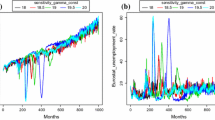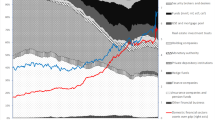Abstract
Stagnation in the world economy and decline in major world economies following the credit crunch of 2007–2008 have contributed to the emergence of a vast literature prescribing economic policy response. The focus is on explaining how the credit crunch occurred and suggesting remedies for resuming economic growth. Much of this literature tracks the wrong solution because it asks only technical questions of a narrow range of mathematical models of the economy where a “rational economic man” is assumed to be in charge of his destiny even when members of the nomenklatura of capitalism pull the strings. When broader issues, for example that of corruption in finance, are raised, they are viewed within the narrow framework of individuals being good or bad. That leads to an impoverished analysis of the credit crunch, viewing the phenomenon entirely as a technical problem in economics requiring a purely mechanical response. Tinkering with the Basle guidance on risk measures, introducing quantitative easing, capping bonuses of the top earners in banks, or levying fines on shareholders do no provide a solution. The structure of the economy does not change. For example, a banking sector that has grown in relation to the size of the economy on the back of an inflationary rise in household wealth in much of the EU (ESRB 2014: 5, figure 8) is difficult to scale down without a substantial downward adjustment in house prices.
Access this chapter
Tax calculation will be finalised at checkout
Purchases are for personal use only
Preview
Unable to display preview. Download preview PDF.
Similar content being viewed by others
References
Ahlfeldt, G.M., Redding, S.J., Sturm, D.M. and Wolf, N. (2014). “The Economics of Density: Evidence from the Berlin Wall,” National Bureau of Economic Research.
Altunbas, Y., Chakravarty, S.P. and Kara, A. (2006). “Do credit markets have faith in IMF imprimatur?” Journal of World Economic Review, 2(2), 219–237.
Bernal, J.D. (1954). Science in History Vol. 1. Harmondsworth: Penguin.
Besley, Tim and Hennessy, Peter (2009). Letter to the Queen: http://www.britac.ac.uk/events/archive/forum-economy.cfm.
Bolton, Patrick, Santos, Tano and Scheinkman, Jose A. (2011). “Cream skimming in financial markets.” NBER Working Paper No. 16804.
British Telecom Reports and Accounts (1989). http://www.btplc.com/Sharesandperformance/Annualreportandreview/Archivedreports/index.cfm.
Chakravarty, S.P. and MacKay, R.R. (1999). “Revolution and counter-revolution: two views of unemployment.” Cambridge Journal of Economics, 23, 337–351.
Chari, V.V. and Kehoe, T. (2006). “Modern macroeconomics in practice: how theory is shaping policy.” Journal of Economic Perspectives, 20(4), 3–28.
Coyle (2012). http://press.princeton.edu/titles/9402.html.
Dow, S., Earl, P.E., Foster, J, Harcourt, G.C., Hodgson, G.M., Metcalfe, J.S., Ormerod, P., Rosewell, B., Sawyer, M.C. and Tylecote, A. (2012). “Letter to the Queen, 10 August.” In: G.M. Hodgson (ed.). Mathematics and Modern Economics. The International Library of Critical Writings in Economics series, 266. Cheltenham: Edward Elgar.
Englund, P. (1990). “Financial deregulation in Sweden. ” European Economic Review, 34, 385–393.
Englund, P. (1999). “The Swedish banking crisis: roots and consequences.” Oxford Review of Economic Policy, 13(3), 80–97.
Foster, John (1993). “Economics and the self-organisation approach: Alfred Marshall revisited?” The Economic Journal, 103(419), 975–991.
Friedman, Milton (1968). “The role of monetary policy.” American Economic Review, 1–17.
Gibson, Heather D. and Tsakalotos, Euclid (eds) (1992). Economic Integration and Financial Liberalization: Prospects for Southern Europe. Basingstoke: Macmillan.
Goldthorpe (eds) (1978). Political Economy of Inflation. Oxford: Martin Robertson.
Hahn, Frank (1982). “The neo-Ricardians.” Cambridge Journal of Economics, Oxford University Press, 6(4), 353–374.
Havel, Vaclav (1979). “Power of the Powerless”. https://www.google.co.uk/?gws_rd=ssl#q=havel+power+of+the+powerless+pdf. Hirsch, Fred (1978). “The Ideological Underlay of Inflation.” In: Fred Hirsch and John Goldthorpe (eds) Political Economy of Inflation. Oxford: Martin Robertson.
Kearl, J., Pope, C., Whiting, G. and Wimmer, L. (1979). A confusion of economists? American Economic Review Proceedings, 69.
Keyfitz, Nathan (1994). “Demographic discord.” The Sciences, September/October, 34(5), 25.
Lengyel, Bela A. (1962). Lasers: Generation of Light by Simulated Emission. New York: John Wiley and Sons.
Lucas, Robert E. Jr and Rapping, Leonard A. (1969). “Real wages, employment, and inflation.” Journal of Political Economy, 77(5), 721–754.
Malkiel, Barton G. (2013) “Asset management fees and the growth of finance.” Journal of Economic Perspectives, 27(2), Spring, 97–108.
McNutt (1996), https://books.google.gr/books?hl=el&lr=&id=IJfqpvbrpawC&oi=fnd&pg=PR6&dq=mcnutt+1996+economics&ots=Cd9ZG3KZj4&sig=Seh5jc9jNPfx9duCUn2u4WMjCb4&redir_esc=y#v=onepage&q=mcnutt%201996%20economics&f=false.
Melitz, J. (1990). “Financial deregulation in France.” European Economic Review, 34(2–3), 394–402.
Mishan, Ezra J. (1982). “The Rationale for the Economist’s Efficiency Criterion,” ch. 4, Introduction to Political Economy. London: Hutchinson.
Phelps Brown, Henry (1983). Origins of Trade Union Power. Oxford: Clarendon Press.
Philippon, Thomas and Reshef, Ariell (2012). “Wages and human capital in the US finance industry: 1909–2006.” Quarterly Journal of Economics, 127(4), 1551–1609.
Phillips, A.W. (1968). “The relation between unemployment and the rate of change of money wage rates in the United Kingdom, 1871–1957.” Economica, 25, 283–299.
Piketty, Thomas (2014). Capital in the Twentieth Century (translated from the French by Arthur Goldhammer). Belknap Press/Harvard University Press.
Pym, Hugh (2014). Inside the Banking Crisis: The Untold Story. London: Bloomsbury.
Radner, Roy (1968). “Competitive equilibrium under uncertainty.” Econometrica, 36(1), January, 31–58.
Rakoff, Jed S. (2014). “The financial crisis: why have no high-level executives been prosecuted? 9 January Issue New York Review of Books.
Robinson, Joan (1972). “The second crisis of economic theory.” The American Economic Review, 62(1/2), 1–10.
Sawyer, John E. (1952). “Entrepreneurial error and economic growth.” Explorations in Entrepreneurial History, 4, 199–204.
Scott, M. Fg. (1982). “The Unemployment Policy Discussion in the UK in the 1970s.” In: Angus Maddison and Bok S. Wilpstra (eds), Unemployment, The European Perspective. London: Croom-Helm.
Sen, Amartya (1993). “On the ethics and economics of finance.” Economics and Philosophy, 9, 203–227.
Shubik, Martin (1970). “A Curmudgeo’s guide to microeconomics.” Journal of Economic Literature, 8(2), June, 405–434.
Skott, Peter (2010). “The great detour.” Homo Oeconomicus, 27(3), 338–333.
Spring, Weale, Martin (2010). “After the Recession: Thoughts on the Growth”, 127–148, http://www.bankofengland.co.uk/publications/speeches/2010/speech461.pdf.
Stiglitz, Joseph (2003). The Roaring Nineties. London: Penguin.
Strange, Susan (1986). Casino Capitalism. Oxford: Blackwell.
Strange, Susan (1998). Mad Money. Manchester: Manchester University Press.
Taylor, John B. (1979). “Staggered wage setting in a macro model.” American Economic Review, Papers and Proceedings, 69(2), 108–113.
Volcker, Paul (2011). “Financial reform: unfinished business.” New York Review of Books, 24 November.
Weintraub, E. Roy (1983). “On the existence of a competitive equilibrium 1930– 1954.” Journal of Economic Literature, 21(1), March, 1–39.
Weitzman, Martin L. (1998). “Recombinant growth.” Quarterly Journal of Economics, 113(2), 331–360.
World Bank (2014). Data accessed 27 November 2014 http://data.worldbank.org/indicator/NY.GDP.MKTP.KD.ZG.
Younge (2014). http://www.theguardian.com/commentisfree/2014/oct/05/carmen-segarra-whistleblower-wall-street-federal-reserve.
Editor information
Editors and Affiliations
Copyright information
© 2015 Shanti P. Chakravarty
About this chapter
Cite this chapter
Chakravarty, S.P. (2015). Globalized Finance in Disarray. In: Thomakos, D.D., Monokroussos, P., Nikolopoulos, K.I. (eds) A Financial Crisis Manual. Palgrave Macmillan Studies in Banking and Financial Institutions. Palgrave Macmillan, London. https://doi.org/10.1057/9781137448309_13
Download citation
DOI: https://doi.org/10.1057/9781137448309_13
Publisher Name: Palgrave Macmillan, London
Print ISBN: 978-1-137-44829-3
Online ISBN: 978-1-137-44830-9
eBook Packages: Palgrave Economics & Finance CollectionEconomics and Finance (R0)




